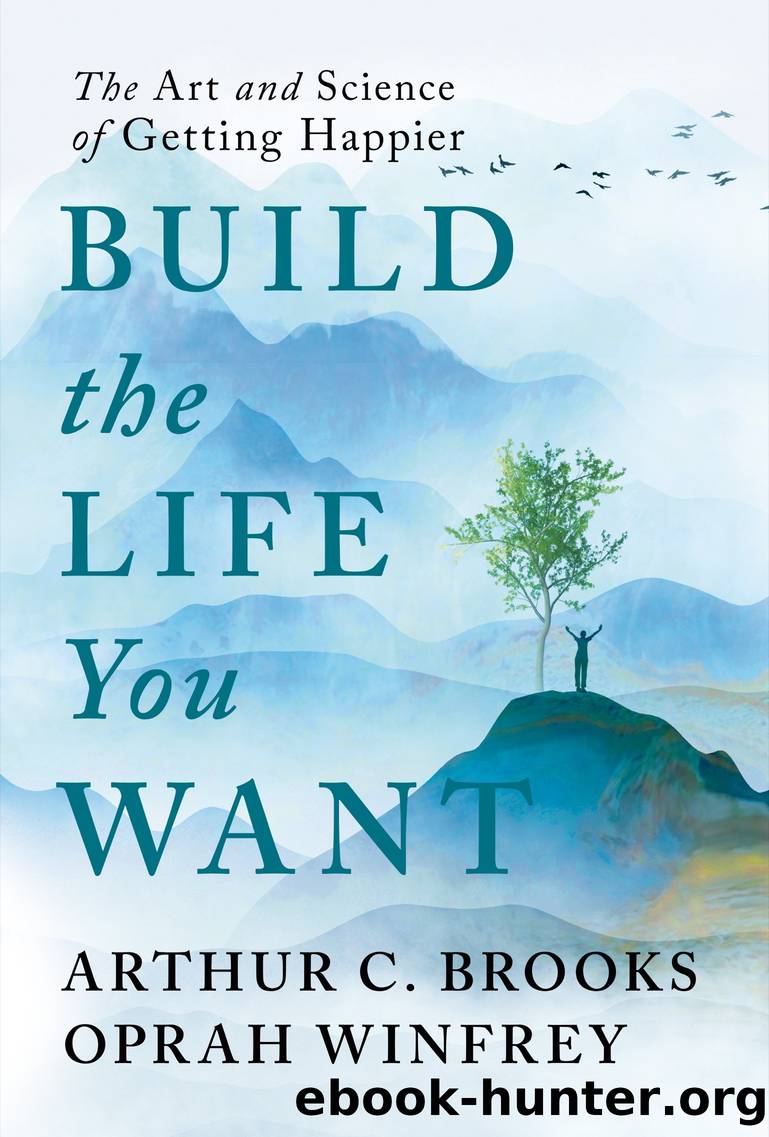Build the Life You Want by Arthur C. Brooks & Oprah Winfrey

Author:Arthur C. Brooks & Oprah Winfrey [Brooks, Arthur C. & Winfrey, Oprah]
Language: eng
Format: epub
Publisher: Penguin Publishing Group
Published: 2023-09-12T00:00:00+00:00
Challenge 1
your personality
By all accounts, Edgar Allan Poe was an introvert. Perhaps you are, too, and you consider that to be an inhibiting factor in the ability to make more friends and get closer to people. It doesnât have to be this way. In fact, what might have seemed like a high personality barrier to your developing more friendships might be your source of strength, if you use it right.
An easy measure of friendship health is the number of friends you have. You will read here or there that you need three friends, or five, or some other specific number to be happy. This is arbitrary, and it doesnât take account of your specific personality. Here is the rule of thumb: you need at least one close friend besides your spouse, and there is an upper limit of perhaps ten friendships that you can realistically spend enough time on to regard them as close. The exact number depends on you, and especially whether you are an introvert or an extrovert. Neither is better or worse than the other if managed properly, but each personality can experience its own difficulties.
Psychologists see extroversion/introversion as one of the Big Five personality dimensions, along with agreeableness, openness, conscientiousness, and neuroticism.[12] The Big Five theory has been a staple of psychology since the 1980s, but the introvert-extrovert binary was first popularized in 1921 by the Swiss psychiatrist Carl Jung, who posited that the two groups have different primary life goals.[13] The former, he thought, seek to establish autonomy and independence; the latter seek union with others. Those stereotypes have persisted to this day.
The German-born psychologist Hans Eysenck further developed Jungâs theory in the 1960s, arguing that our genetics determine our relative extroversion.[14] He believed that cortical arousalâthat is, the brainâs level of alertnessâwas more difficult to achieve for extroverts than introverts, so the former seek stimulation in the company of others, ideally the fresh company of new people.[15] Subsequent research has shown mixed results on Eysenckâs specific theory, but has found clear cognitive differences between the groups.[16]
In general, extroverts are happier than introverts. In 2001, a group of Oxford scholars broke a sample of survey respondents into four groups: happy extroverts, unhappy extroverts, happy introverts, and unhappy introverts.[17] The happy extroverts outnumbered the happy introverts by about two to one. One common explanation for the happiness differential between introverts and extroverts follows from stereotypes like Jungâs and Eysenckâs: humans are inherently social animals, so contact brings happiness; extroverts seek out contact, so they are happier.
Extroverts also have a natural edge in enthusiasmââa passionate state of mind,â according to one famous psychoanalyst in the 1960sâwhich is one of the elements of personality most closely associated with happiness.[18] Enthusiasm about lifeâs events leads to higher enjoyment and a better mood. It also lowers the tendency to withdraw socially.
The fact that introverts prefer solitude and often struggle with sociability doesnât mean that they donât need friends. It just means that new friendships can be harder for them to establish.
Download
This site does not store any files on its server. We only index and link to content provided by other sites. Please contact the content providers to delete copyright contents if any and email us, we'll remove relevant links or contents immediately.
The Power of Now: A Guide to Spiritual Enlightenment by Eckhart Tolle(5291)
The Miracle Morning by Hal Elrod(4391)
Rising Strong by Brene Brown(4169)
Being Aware of Being Aware by Rupert Spira(3055)
The Secrets to Charisma and Personal Magnetism: Learn a hidden energy tradition to become magnetically attractive and vitally alive by Martins Bruno(2593)
The Gifts of Imperfection by Brene Brown(2406)
The Lost Art of Good Conversation by Sakyong Mipham(2398)
The Songlines by Bruce Chatwin(2389)
A New Earth: Awakening to Your Life's Purpose by Eckhart Tolle(2352)
The Power Of Now by Eckhart Tolle(2090)
All Things New by John Eldredge(2033)
The Untethered Soul: The Journey Beyond Yourself by Singer Michael A(1949)
The Nature of Consciousness by Rupert Spira(1948)
The Empath's Survival Guide by Judith Orloff(1917)
Thoughts Without A Thinker: Psychotherapy from a Buddhist Perspective by Epstein Mark(1869)
The Seat of the Soul by Gary Zukav(1826)
Practicing the Power of Now by Tolle Eckhart(1786)
The Yoga of Jesus: Understanding the Hidden Teachings of the Gospels by Paramahansa Yogananda(1733)
Be Feel Think Do by Anne Berube(1719)
